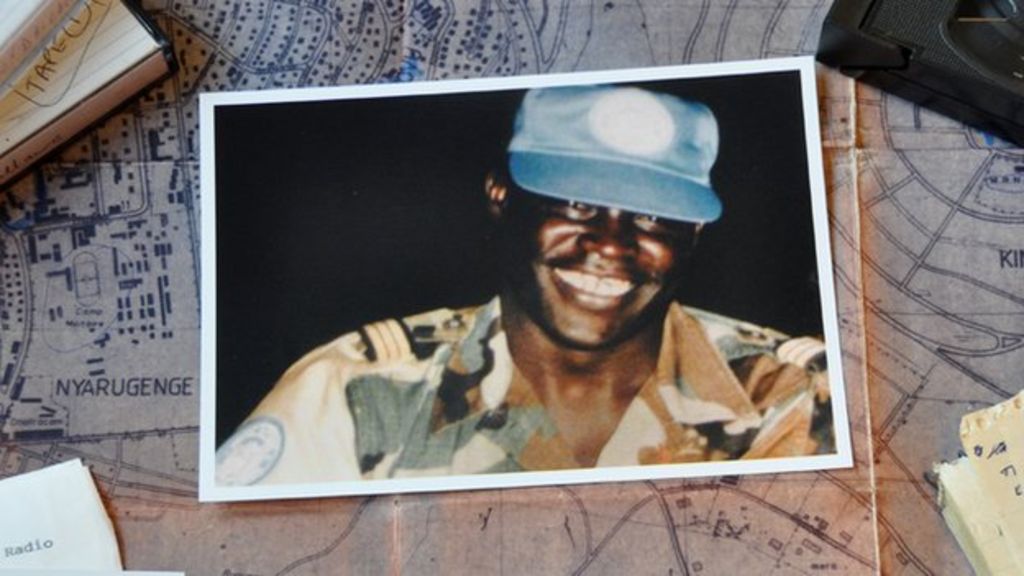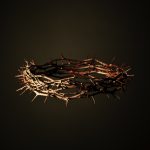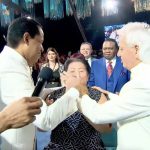
During the Rwandan Genocide, the UN, USA, Belgium and other powers had forces on the ground but refused to lift a finger to help. They stood by and watched while hundreds of thousands were butchered. Their presence was simply to make sure expats were safe. The US refused to act because first intervention costs money and also months prior its armed forces had ben disgraced at Mogadishu and they did not want to repeat that mess.
One UN Peacekeeper, unarmed Captain Mbaye Diagne, a Senegalese Army officer, taking huge risks, disobeyed the U.N.’s standing orders not to intervene. During the massacre, with one ethnic group butchering the other, this unsung hero delivered [saved] up to 1,000 people single-handedly from certain death. The figure could be higher. Twenty years later, the same UN which asked its peacekeepers to stand-down, now has created an award to honour “The forgotten angel of Rwanda” for his selfless service that ultimately led to his own untimely death. The medal created is “Resolution 2154 (2014) Recognizes Exceptional Courage in Face of Extreme Danger”. It is interesting to note that this hero was forgotten till 20 years after the genocidal acts.
The following are the words of the United Nations:
Unanimously adopting resolution 2154 (2014), the Council created the “Captain Mbaye Diagne Medal for Exceptional Courage”, to be awarded to military, police and civilian United Nations or associated personnel. It noted with deep appreciation how Captain Diagne, unarmed and in the face of extreme danger, had saved hundreds, perhaps even a thousand, Rwandans from death during the 1994 genocide. Also by the text, the Council recognized with the deepest regret how, after his death, Captain Diagne’s family had never received any expressions of appreciation from United Nations Headquarters for the sacrifices made by their distinguished family member.
Eugène-Richard Gasana (Rwanda) described Captain Diagne as a hero who had refused to be a bystander in the face of evil. He had acted as a peacekeeper, a solider and a human to save lives while armed only with courage and a sense of responsibility. He had conducted several missions through dozens of checkpoints to save up to 1,000 people during the genocide, and the medal was not only a recognition of his courage, but also a reminder of what a solider, a peacekeeper, should be — a women or man dedicated to preserving peace, saving lives and protecting the vulnerable. He expressed hope that the medal would encourage better promotion of the protection of civilians in the future and serve as a reminder of the historic acts of ordinary Rwandans, as well as other “blue helmets” who often paid the ultimate price to protect lives. He also voiced hope that the medal would result in soul-searching at the United Nations and help to ensure that the community of nations collectively preserved humanity, guided by moral rules and principles, rather than relying on the brave actions of individuals.
Zeid Ra’ad Zeid Al-Hussein (Jordan), addressing himself to Captain Diagne’s family, noted that for 20 years they had grieved the loss of a man who had once served the United Nations. It was shameful that no official from Headquarters had ever called the family following his death, he said, adding that he believed he spoke for everyone present in emphasizing how “profoundly sorry” he was for the manner in which the family had been treated.
Captain Diagne was the finest example of what the human family could produce, and the Security Council not only honoured his memory, but in creating a medal in his name, would for the first time in United Nations history publicly recognize those who performed amazing feats in the face of extreme danger.
For more on this story see:
BBC Article—A Good Man in Rwanda
PBS Frontline—Memories of Captain Mbaye Diagne






